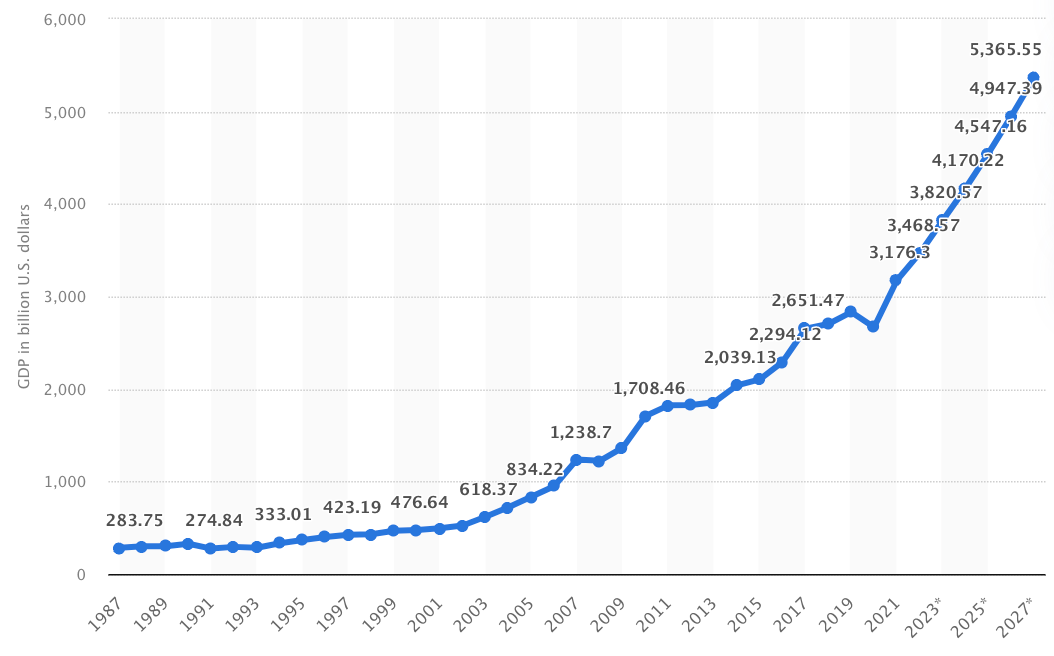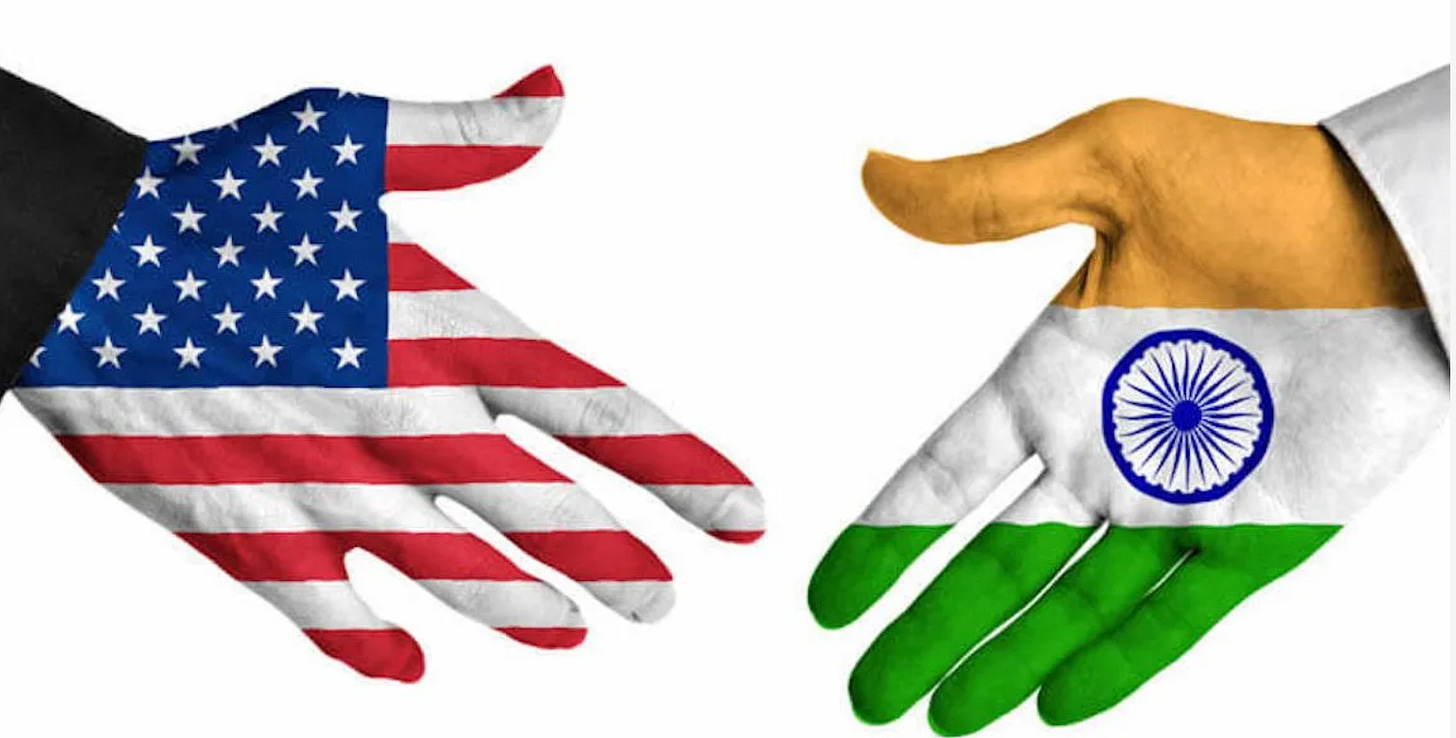China is no longer the world’s most populous nation, as of this month, which sparked a narrative in the world press about its long-term decline. What was missed, however, is that India has not only overtaken China demographically but its economic growth and future prospects are considerably brighter. The “sleeping giant” stumbles, due to Covid, real estate, and diplomatic debacles while India just overtook Britain as the world’s fifth largest economy, thanks to smart policies and technology that generates economic development from the bottom up. A biometric card, issued to everyone since 2009, allows Indians of all ages access to its economy and social safety net. Fingerprints, photos, and data are embedded in these cards that serve as a passport, driver’s license, food voucher, school pass, health card, bank card, credit card, or rail pass. The card provides opportunities, harnesses enterprise, transforms government, and pays enormous dividends to the country, according to billionaire entrepreneur Anand Mahindra. “This ID allows direct transfers to the poorest without corruption in between.”
India lumbers toward superpower status, a nuclear power with the best diplomatic moxie of any nation in the world. It assumes the G20 Presidency this year. Its economy booms. India’s GDP of $3.8 trillion places it in the Big Five, behind the United States, China, Japan, and Germany. By 2030, based on current growth rates, India will be the world’s third largest economy with a GDP of $5 trillion — larger than Japan and Germany. And by 2050, it will overtake China and be second in size only to the United States.
“Given the pace at which the government has been executing a vast multitude of simultaneous social and economic reforms, I anticipate that within the next decade, India will start adding a trillion dollar to its GDP every 12 to 18 months," forecasts Gautam Adani, Asia’s richest man. “A country, crushed and drained by its colonial rulers, today stands on the cusp of an extraordinary growth and is the only major country on a path to emerge as a high-income nation without compromising its democracy and diversity.”
But India still remains afflicted with gender inequality. Many females are trapped in its oppressive dowry system, discouraged from working outside the home, and denied equal access to education in rural areas. Urbanization tempers this somewhat, and Prime Minister Narendra Modi has cited “gender parity” and female education as essential pillars to building the nation. The country-wide female literacy rate has improved and is 70.3 per cent, but still short of the 84.7 per cent literacy rate among males. To further bolster growth and opportunity, India is considering an incentivized version of China’s one-child policy.
India’s geopolitical influence exceeds China’s, Russia’s, and other rising economies. The country is wooed by many and able to juggle networks, national interests, and loyalties with aplomb. It has forged many alliances. In 2007, New Delhi co-founded the “Quad” (Quadrilateral Security Dialogue) with Japan, Australia, and the U.S. in order to keep an eye on China. The four stage military exercises and share intelligence and the Quad now includes New Zealand, South Korea, Vietnam, and other Asian nations like the Philippines and Singapore as observers.
In 2009, BRIC was formed, an acronym representing the four rising economic powers at the time of Brazil, Russia, India, China then eventually South Africa. The original aim, established before Putin went on his rampage and the China-India border clash worsened, was to establish an equitable, democratic, and multi-polar world order. Obviously, the organization is defunct, but India retains good relationships with all partners. This June, India joined a new grouping dubbed I2U2, or the “West Asian Quad”, that includes India, Israel, the United States and United Arab Emirates. This assemblage monitors Middle East and Afghanistan affairs.
But in 2023, India takes center stage geopolitically as its Prime Minister Narendra Modi presides over the prestigious G20 summit, and initiatives. This Club was formed to deal with the Great Recession and its members represent 85 per cent of world GDP, over 75 per cent of global trade, and about two-thirds of the world population. Russia is technically still a member, but didn’t show up this summer, and the G20 strongly denounced “Russian aggression”.
India juggles relationships in the aftermath of Russia’s brutal invasion. For instance, it is the only member of the Quad that doesn’t sanction Russia and even participated in military exercises with Russia and China recently, despite objections from other members. India has traditionally relied on Russia to counter-balance China’s support for India’s regional arch rival, Pakistan. Today, India remains the world’s largest buyer of Russian munitions — as well as American weapons — used in fighting its lengthy, low-grade border clash with China. And after the Ukraine invasion, India negotiated enormous discounts for oil from Russia and, in return, has refused to officially condemn the war, as has China. But this fall, Modi publicly chastised Putin about the violence in Ukraine and for threatening nuclear attacks. And on December 9, Modi declined to attend the 22nd annual India-Russia summit in Moscow.
Meanwhile, Washington has placed India at the center of its ambition to diversify trade away from China and other adversaries. India is already a global giant in pharmaceutical manufacturing but, with Western investments, intends to overtake China’s pre-eminence in production of semiconductors, solar panels, automobile components, medical devices, telecoms equipment, and electric vehicles. India has genuine competitive advantages over China going forward: Its population speaks English, its science and IT sectors are world-class, and its massive population represents an enormous business opportunity for multinational manufacturers who invest there. Already, the United States has become India’s biggest trading partner.
Obviously, India still faces headwinds, but the world’s largest democracy has finally earned a place as one of the world’s greatest nation-states and powerhouses.








India's continuing ties to Putin/Russia are a concern. The country seems to be playing all sides and this isn't the time for that, in my opinion. India needs to pick a side.
Record growth has not come without cost....the filthiest cities in the world are in India. https://www.bbc.com/news/world-asia-50298972